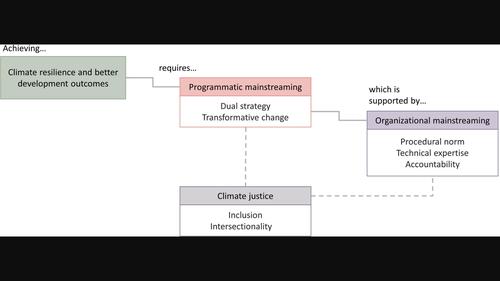Greener through gender: What climate mainstreaming can learn from gender mainstreaming
引用次数: 0
Abstract
Addressing the urgent global climate crisis demands a rapid and meaningful expansion of “climate mainstreaming,” which refers to the integration of climate objectives in all aspects of development programs and policies. However, progress remains slow and uneven due to bottlenecks in policy and institutional change. Considering the parallel struggle recorded over decades to mainstream gender across the same policy arenas, a key question emerges: what can climate mainstreaming learn from gender mainstreaming? To answer this question, we review 57 policy, strategy, and guidance documents of United Nations agencies, all of which integrate these themes into food security and broader development programming. Our analysis identifies gaps in climate mainstreaming efforts and derives lessons from gender mainstreaming to bridge these gaps. It underscores the importance of adapting programmatic mainstreaming strategies in response to evolving contexts, for example, by simultaneously considering both mainstreaming and targeted interventions. Additionally, it highlights the need to adopt organizational climate mainstreaming and establish mechanisms for accountability. Finally, it emphasizes the urgency of embracing a climate justice lens; in practice, this involves prioritizing populations at greater risk of climate change impacts and actively engaging diverse perspectives in decision-making, particularly communities facing multiple forms of discrimination.

通过性别更环保:气候主流化可以从性别主流化中学到什么
要应对紧迫的全球气候危机,就必须迅速、切实地扩大 "气候主流化",即把气候目标纳入发展计划和政策的各个方面。然而,由于政策和制度变革方面的瓶颈,进展依然缓慢且不平衡。考虑到几十年来在相同政策领域将性别观点纳入主流的平行斗争,一个关键问题出现了:气候主流化可以从性别主流化中学到什么?为了回答这个问题,我们回顾了联合国机构的 57 份政策、战略和指导文件,所有这些文件都将这些主题纳入了粮食安全和更广泛的发展规划中。我们的分析确定了气候主流化工作中的差距,并从性别主流化中汲取经验教训,以弥补这些差距。它强调了根据不断变化的环境调整计划主流化战略的重要性,例如,同时考虑主流化和有针对性的干预措施。此外,报告还强调了采用组织氛围主流化和建立问责机制的必要性。最后,报告强调了采用气候正义视角的紧迫性;在实践中,这涉及优先考虑受气候变化影响风险更大的人群,并积极让不同观点参与决策,特别是面临多种形式歧视的社区。
本文章由计算机程序翻译,如有差异,请以英文原文为准。
求助全文
约1分钟内获得全文
求助全文

 求助内容:
求助内容: 应助结果提醒方式:
应助结果提醒方式:


